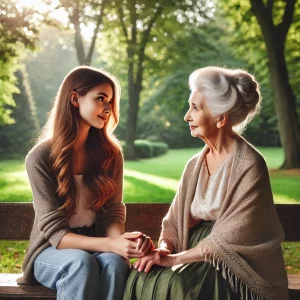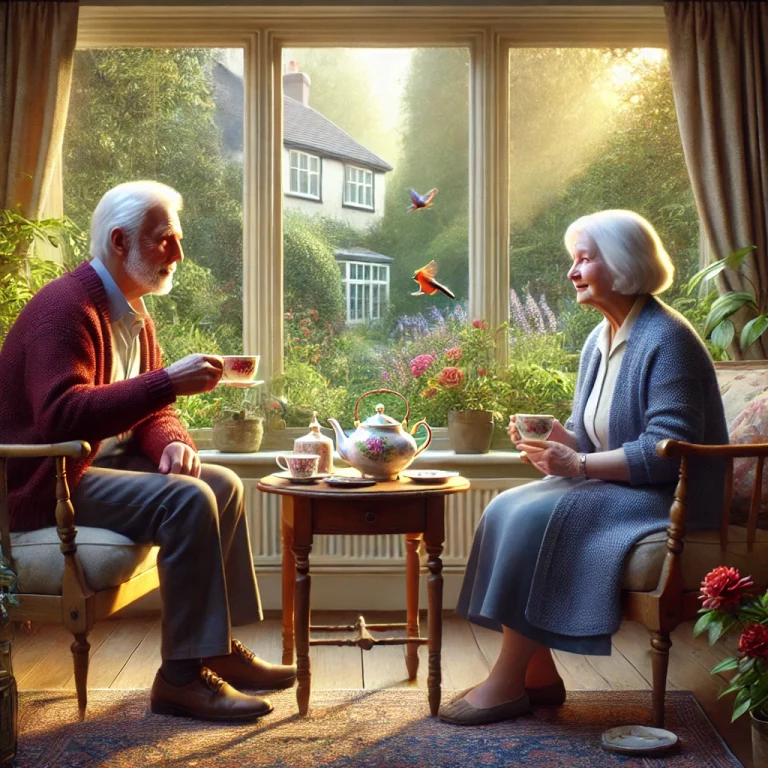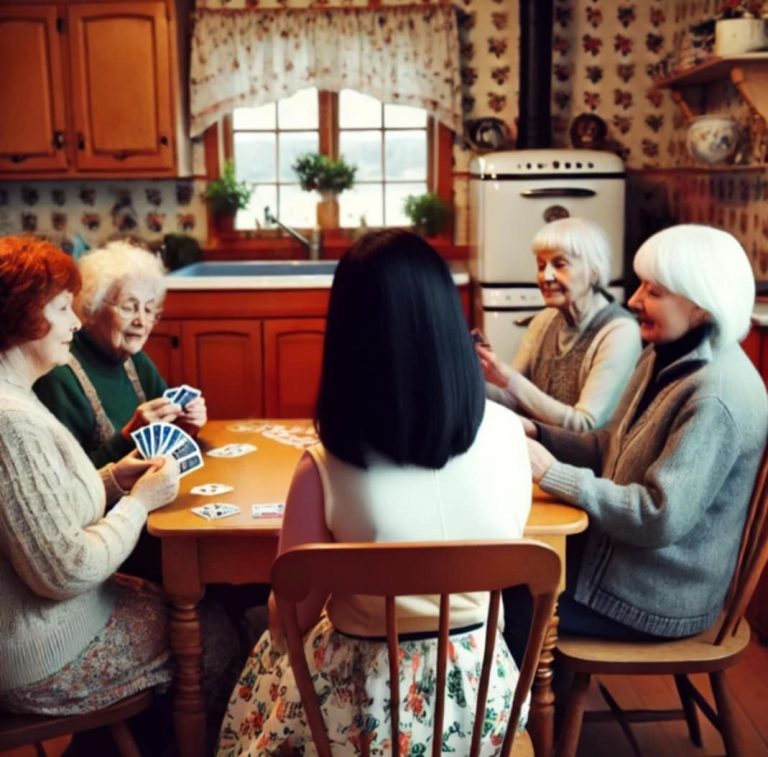By Lottie M Hancock
Reading time: 13 minutes | Published: February 2025
I walk the park every morning if it isn’t snowing. New York is a beautiful place when you know where to look. Few know of the smaller parks on the outskirts. The trees and lack of concrete let you forget you are in an industrial city. People come here to walk their dogs and play Frisbee with their children even in the cooler months like it has been. A couple of weeks ago, I had seen a small, elderly lady sitting at the park bench looking over the pond. She wasn’t different from anyone else I had seen there, but for some reason, she just seemed special. I may have nodded once or twice as I walked by but that was it until this morning.
A rock in my shoe prompted me to sit down on the bench with her. As I wrestled the shoe off and dislodged the bruising object from my sole, I smiled and said hello.
She had a sweet smile. Her face was full of wrinkles and her eyes were a brilliant blue. Her hair was gathered up in a bun with a hair pick that looked like it was made of mother of pearl. She was the ideal portrait of a wholesome grandmother.
I had no place to go in any hurry since classes didn’t start at NYU for another two weeks, so I sat and chatted with her for at least half an hour. She left to catch her bus soon after that. The next morning, she was back at that same bench, and I stopped to say hello. This has been going on daily since then.
My college major is photojournalism. I grew up with my nose in National Geographic looking at the news as told in pictures more than by the words. I had already picked up my syllabus and it said that my new professor wanted us to come to class prepared with a photo that would tell its own story.
I walked through the park with my Nikon camera hanging around my neck in hopes that the perfect story would appear. The sweet old lady was back at her bench looking out over the pond and the ducks.
There it was. She was my story.
I sat with her and asked if she would mind if I took her picture.
“Why would you want a picture of me?” she chuckled.
I explained what I was going to school for and that my professor asked for a photo that would speak to him. She agreed to the picture but could not fathom why or how she could be of any interest to anyone. She was simply Annie.
Annie.
I hadn’t realized I had never asked her what her name was. I suppose it is the whole New York attitude thing, but I was embarrassed, nonetheless. Classes started the next morning, but I was looking forward to the weekend when I could chat with her once again.
The next morning, I was almost late for my first class because I had forgotten to develop the pictures I had taken. They were dry in time, gratefully, and I felt a sense of relief when I put the brown envelope containing the woman’s picture on my professor’s desk.
The day went well, and I met some nice people in my classes. At the end of class the next day, however, my teacher called me over to his desk. I must admit that this made me nervous. I mean, it was only the second day, and I was already being singled out.
He was a middle-aged man perhaps in his fifties. He was a bit thin and looked like a stereotypical college professor. He had a Roman nose and his dark hair was a bit scruffy. He wore a wool vest and a long-sleeved shirt that he always kept buttoned to a neck adorned with reading glasses hanging from a strap.
He waited until the last student walked out and sat at the corner of his desk. My picture was in his hand.
“May I ask where you took this?”
“At the park.”
He slipped his glasses back on his face and looked hard into the picture.
“It is a very powerful picture.”
I admit it. I breathed a sigh of relief. It did what it was supposed to do. It had a message.
“Thanks.”
“The photo itself tells me a story of a woman who has lived a strong life. She didn’t need to smile to show me she is happy. You didn’t need to tell me her story to tell me she had a hard life.” There was something else. I could tell by the way he was still looking at the photo. “She is compelling.”
“Is something wrong?”
“To be honest, those eyes have me,” he admitted as he took off his glasses and looked at me. “Can you introduce me to her?”
Yes, I was surprised and excited. My photo stirred something within him. If it was anyone else, that would have been good enough, but this was a college professor who sees these pictures all day long and can become immune to such things. I agreed and told him to meet me at the park that Saturday. I hoped the woman wouldn’t choose to skip that day or become offended that I had brought someone to meet her. It was the risk I had to take.
Saturday morning, I stood at the park entrance armed with three lattes. There was a chill in the air, and I could see my breath cloud in front of me. My professor pulled up and we walked toward the pond without saying anything other than the thank you I got for the coffee. He looked nervous. This puzzled me but I was not about to press the matter. The first week of class and this was becoming a hands-on sort of situation.
The woman was tossing breadcrumbs out to a duck that had come close to her feet. She looked up as we approached. She smiled as always but I saw the curiosity in her eyes. I sat down beside her and handed her the coffee.
“Annie, this is my professor from the college. He saw your picture and wanted to meet you.”
Her eyes were already studying the man’s face intently and my professor looked at her like she was the Madonna incarnate.
“Annie, may I ask you a personal question?” he surprised us both by asking so abruptly but she nodded.
“Were you at Auschwitz?”
The woman’s smile faded quickly, and her eyes dulled. She nodded quickly and looked down at her hands. She pushed back her sleeve slightly and I saw numbers tattooed on worn, thin skin. She slipped her sleeve back over the strange markings.
This puzzled me since I had no idea where this place was or why she would have numbers stamped on her like that, but what really surprised me was that my professor started to cry.
“Annabella Przybylski? Is that your name?”
The woman started to shake, and I got scared. I mean really scared. Those beautiful blue eyes looked terrified. I could practically see terrible memories flashing in them.
He reached over, clasped his hands around hers, and shushed her calmly. “It’s alright. Don’t be afraid. No one is ever going to hurt you like that ever again. Do you believe me?”
His eyes were so comforting. They almost beckoned her to relax.
“I was also at Auschwitz as a boy. I was taken from my mother and grandmother at the camp and placed with other children. I never saw them again.”
She sat silently and looked over at the water. I could tell she was remembering days like he described happening around her. It tore at my heart to see these two people who had lived such horrifying experiences.
“My boy was taken. My little angel,” she said with broken sounds. She seemed determined not to cry.
“I know.”
I couldn’t believe it. I finally caught on. It took a few minutes, but she also put the puzzle pieces together.
As it turned out, when Annie was a young mother, her husband had been killed by Nazi soldiers, and her family was captured as they tried to escape Poland during the war. The Nazis threw them into a concentration camp called Auschwitz-Birkenau. The conditions there were something out of a horror film. Many people died either from malnutrition or just murder. Families were ripped apart. Some people were experimented on. Children were isolated from their mothers to see what physical effects would occur on them. Annie’s son was taken away and they told her nothing after that. She remained in the camp with her mother until her mother died from exposure a few months later. She withstood the torture for two years until she was finally released.
My professor, although he seemed as American as they come, was born in Poland and most of his childhood memories were about being tormented in Auschwitz. He was one of the few that had escaped the camps and was smuggled into the United States. He was told his mother had been killed. Now, he was looking at her.
He had explained that the picture looked so much like his grandmother, he had to investigate. I suppose my photo did what it was meant to do. It conveyed a story without words. I am glad. That was a story that I am not sure I would be courageous enough to write myself.





